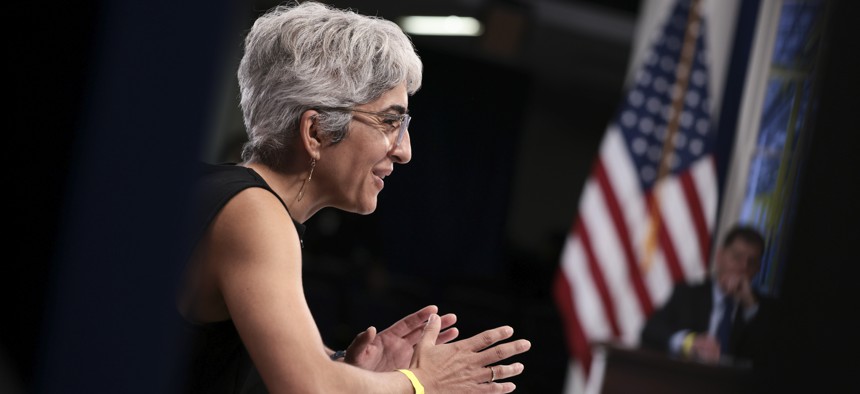
Anna Moneymaker/Getty Images
OPM Issues More Guidance to Encourage Collective Bargaining at Agencies
Building on President Biden’s executive order encouraging more collaborative labor-management relations, OPM strongly encouraged federal agencies to improve unions’ ability to communicate with workers and collect dues.
The Office of Personnel Management on Tuesday issued a trio of memos aimed at making it easier for labor groups to communicate with federal workers, collect union dues and organize new workplaces in the federal government.
The three sets of guidance, issued by OPM Director Kiran Ahuja, build on President Biden’s 2021 executive order aimed at identifying new and existing policies across the federal government to encourage workers in both the public and private sector to organize and form labor unions and reaffirming that agencies should act as a "role model” for employers.
In a blog post, Ahuja said the changes are all part of the administration’s goal of making the federal government a “model employer” and will create a healthier dynamic for unions to both protect employees and improve agencies’ productivity.
“More than half of non-postal executive branch civilian workers (nearly 1.25 million people) are represented by some 2,000 bargaining units, but only a third of them are dues-paying members,” Ahuja wrote. “This strains the ability of federal unions to provide fair representation to all of their bargaining unit members, regardless of whether they pay dues or not. By removing barriers that impede unions’ ability to organize, represent bargaining unit employees, and inform civil servants about their collective bargaining rights, the federal government is serving as a model employer for others to see how strong labor rights and a productive workforce go hand-in-hand.”
The guidance “strongly encourages” agencies to negotiate with unions to allow labor groups to post information on agency bulletin boards and intranet sites, to solicit membership and distribute educational materials at agency worksites and communicate with employees via email on non-duty time, and to be a part of agency town halls and the orientation process for new workers. It also encourages agencies to provide union officials a list of the names and contact information for all bargaining unit employees on a “periodic” basis.
Ahuja stressed that in instances where unions have access to employees during duty time, they can only provide information about their collective bargaining rights and are barred from soliciting membership.
“The solicitation of union membership is a right protected under [federal labor law],” she wrote. “However, [the law] specifically requires that such solicitation of membership ‘be performed during the time the employee is in a non-duty status.’ Since new employee orientation sessions are held during duty hours, a union cannot solicit bargaining unit employees to become dues paying union members. In one decision, the [Federal Labor Relations Authority] found that the requirement that an employee be in a non-duty status applies both to the employees being solicited and to the employees soliciting.”
The guidance also instructs agencies to ensure that they process requests to start or end the collection of union dues from federal workers’ pay checks “as quickly and accurately as possible,” as well as make the forms required to start or end union dues readily available and the “periodically communicate” how to access those forms.
And OPM encouraged agencies to train agency managers on labor organizing, specifically the requirement that agency officials remain neutral during an organizing campaign and union election.
“Federal labor law recognizes that statements to employees by supervisors, managers and other officials of the agency that employs them may carry disproportionate weight and have the potential for interfering with the free choice of employee voters,” OPM wrote. “Whether or not a particular statement falls within the protection of this law depends heavily on the specific circumstances. Therefore, in order to maintain the agency’s neutrality, OPM recommends that agency officials refrain from volunteering any comments regarding a union organizing campaign.”
In a statement, American Federation of Government Employees National President Everett Kelley applauded the series of memos.
“By simply declaring that it will remain neutral on union organizing campaigns, will inform employees of their rights, and will process payroll dues deduction requests by employees in a timely manner, the White House is sending a powerful message to employers everywhere that efforts to interfere with union elections and workers’ rights should not be tolerated,” he said.







